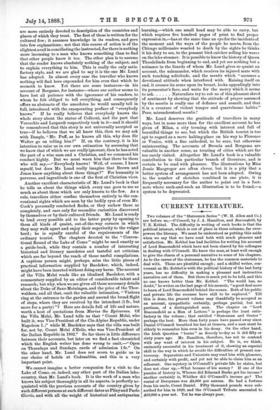CURRENT LITERATURE.
Two volumes of the "Statesmen Series" (W. H. Allen and Co.) are before 1113,-0' Connell, by J. A. Hamilton, and Beaconsfield, by T. E. Kebbel. The difficulty in writing of such books is that the political interest, which is out of place in these columns, far over- powers the literary. We must be understood as putting this aside when we say that we have read both with much pleasure and satisfaction. Mr. Kebbel has had facilities for writing his account of Lord Beaconsfield which have not been shared by his colleague in dealing with O'Connell. He knew the man, at least well enough to give the charm of a personal narrative to some of his chapters. As to the career of the statesman, he has the common materials to deal with. These are plentiful enough ; and a skilful writer, con- versant as Mr. Kebbel is with the political history of the last forty years, has no difficulty in making a pleasant and instructive narrative out of them. But there is much yet to be told, and this no one knows better than Mr. Kebbel. "The world has, no doubt," he writes on the last page of his memoir, "a good deal more to learn of Lord Beaconsfield behind the scenes. Both of his public and private life the recesses have still to be explored." Till this is done, the present volume may thankfully be accepted as an account, sympathetic certainly, perhaps partial, but not partisan, of a distinguished man. The chapter on "Lord Beaconsfield as a Man of Letters" is perhaps the least satis- factory in the volume; that entitled "Statesman and Orator" perhaps the best. More than forty years have passed away since Daniel O'Connell breathed his last at Geneva, and a man must be elderly to remember him even in his decay. On the other hand, the Irish Question " burns " as fiercely to-day as it did fifty or sixty years ago. Mr. Hamilton, therefore, has not to contend with any want of interest in his subject. He is, we think, eminently successful in his treatment of it, showing an especial skill in the way in which he avoids the difficulties of present con- troversy. Separatists and Unionists may read him with pleasure, and certainly with profit, and yet not be able to claim him as an adherent. One mystery in O'Connell's private life he states, but does not clear up,—What became of his money ? If one of the puzzles of history is, Whence did Edmund Burke get his income ? another certainly is, Whither divl O'Connell's income go ? The rental of Derrynane was .84,000 per annum. He had a fortune from his uncle, Count Daniel. Fifty thousand pounds were sub- scribed for him in 1829, and the O'Connell Tribute amounted to 410,000 a year net. Yet he was always poor.


































 Previous page
Previous page